
Educational and Developmental Psychologist
Scope & Guideline
Shaping the future of educational psychology through rigorous research.
Introduction
Aims and Scopes
- Educational Psychology:
Focuses on the psychological principles that underpin teaching and learning processes, including cognitive engagement, emotional well-being, and social dynamics within educational settings. - Developmental Psychology:
Explores the psychological growth and changes across the lifespan, particularly in childhood and adolescence, addressing factors that influence developmental trajectories. - Psychological Assessment and Intervention:
Investigates assessment methodologies and intervention strategies aimed at enhancing psychological well-being and educational performance, including both qualitative and quantitative approaches. - Cultural and Contextual Influences:
Examines how socio-cultural factors affect psychological outcomes in educational contexts, with a particular emphasis on the experiences of diverse student populations. - Policy and Practice Integration:
Focuses on bridging research and practice by assessing the implications of psychological research on educational policy and the implementation of effective practices in schools.
Trending and Emerging
- Digital and Technological Influences:
There is a notable increase in research exploring the impact of digital technology and online environments on student engagement, well-being, and learning outcomes, reflecting the growing relevance of technology in education. - Social-Emotional Learning (SEL):
A significant emphasis on social-emotional learning initiatives suggests a trend towards understanding the importance of emotional intelligence and interpersonal skills in educational settings. - Cultural Adaptation and Diversity:
Emerging themes focus on the experiences of diverse student populations, including international students and those from refugee backgrounds, highlighting the need for culturally responsive educational practices. - Resilience and Well-being:
Research on resilience, particularly in the context of challenges such as the COVID-19 pandemic, indicates a growing interest in understanding how students cope with adversity and enhance their psychological well-being. - Intergenerational Learning and Support:
The exploration of intergenerational programming and its impact on learning and emotional support reflects a trend towards collaborative learning environments that include multiple age groups.
Declining or Waning
- Traditional Assessment Methods:
There appears to be a reduced focus on conventional testing and assessment methods, with a growing preference for dynamic and holistic approaches to evaluating student capabilities. - Narrowly Defined Psychological Disorders:
Research on specific psychological disorders, such as Autism Spectrum Disorder, has become less frequent, suggesting a shift towards a more integrated understanding of mental health and well-being in educational contexts. - Static Views of Intelligence:
The exploration of fixed intelligence models is declining as the journal increasingly embraces growth mindset perspectives and the dynamic nature of cognitive abilities. - Generalized Interventions:
The trend of discussing generalized psychological interventions without a contextual focus is waning, as more research emphasizes tailored and context-specific strategies.
Similar Journals
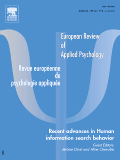
EUROPEAN REVIEW OF APPLIED PSYCHOLOGY-REVUE EUROPEENNE DE PSYCHOLOGIE APPLIQUEE
Connecting Scholars and Practitioners in PsychologyEUROPEAN REVIEW OF APPLIED PSYCHOLOGY-REVUE EUROPEENNE DE PSYCHOLOGIE APPLIQUEE, published by Elsevier France - Editions Scientifiques Medicales Elsevier, is a prominent peer-reviewed journal that focuses on the dynamic field of applied psychology. With a strong commitment to advancing psychological research and practice, this journal aims to present cutting-edge findings and innovative methodologies that resonate with both academic scholars and professionals in the field. The journal is categorized in the 2023 Q3 quartile for Applied Psychology and holds a respectable rank of 159 out of 249 in Scopus's applied psychology category, emphasizing its significance in the academic community. With an ISSN of 1162-9088, the journal continues to provide a platform for insightful articles, fostering knowledge exchange among researchers and enhancing educational outcomes for students. Although it does not currently offer open access, it remains a key resource for those looking to stay informed about the latest developments in applied psychological science, making it an essential read for anyone dedicated to exploring the practical applications of psychology in various contexts.

Indian Journal of Psychological Science
Nurturing Psychological Science: A Resource for All.The Indian Journal of Psychological Science is a premier academic publication dedicated to advancing the field of psychology in India and beyond. Published by the Natal Association of Psychological Science, this journal covers a wide range of topics, including cognitive psychology, clinical psychology, social behavior, and educational psychology, making it a vital resource for researchers, practitioners, and students alike. With its ISSN of 0976-9218 and a commitment to rigorous peer review, the journal aims to disseminate high-quality research that informs practice and policy in psychological science. Although currently listed under conventional access options, the journal aspires to embrace open access in the future, enhancing its reach and impact. Nestled in the heart of Chandigarh, Haryana, the Indian Journal of Psychological Science not only contributes to the scholarly discourse in its domain but also supports the development of psychological science in India, making it a crucial outlet for new findings and innovative practices.
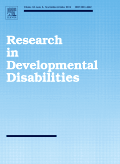
Research in Developmental Disabilities
Connecting research to real-world applications in education and psychology.Research in Developmental Disabilities is a leading journal published by PERGAMON-ELSEVIER SCIENCE LTD, dedicated to advancing the field of developmental disabilities through rigorous research and evidence-based insights. Since its inception in 1987 and continuing through 2024, the journal has made significant contributions to the understanding of developmental and educational psychology, earning a commendable impact factor and ranking in the Q2 quartile in both Clinical Psychology and Developmental and Educational Psychology categories for 2023. The journal, with ISSN 0891-4222 and E-ISSN 1873-3379, features original research articles, reviews, and practical applications aimed at professionals, researchers, and students in the field, fostering a multidisciplinary dialogue around theories, interventions, and policies that shape the lives of individuals with developmental disabilities. While currently not an open access journal, it offers a crucial platform for disseminating knowledge and sparking innovative approaches to enhance educational and psychological outcomes for affected populations. With its roots in the United States and a global influence, Research in Developmental Disabilities is vital for those committed to understanding and improving the developmental trajectories of individuals facing these unique challenges.
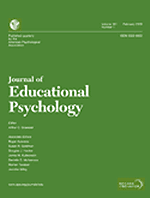
JOURNAL OF EDUCATIONAL PSYCHOLOGY
Elevating Educational Psychology to New HeightsJOURNAL OF EDUCATIONAL PSYCHOLOGY, published by the American Psychological Association, stands as a crucial resource in the fields of developmental and educational psychology. With an impressive impact factor that secures its position in the Q1 quartile of both developmental and educational psychology categories, this journal caters to a diverse audience comprising researchers, educators, and policy-makers. Since its inception in 1910, it has consistently provided groundbreaking research and insights that shape educational practices and psychological theories. The journal’s Scopus rankings reflect its significant influence, being positioned within the top 2% of journals in social sciences education and the top 4% in developmental psychology. Although the journal does not offer open access, its rigorous peer-review process ensures the publication of high-quality articles that advance the understanding of learning processes and educational methodologies. Researchers and practitioners alike will find invaluable contributions that inform and transform the educational landscape.
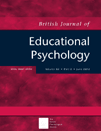
BRITISH JOURNAL OF EDUCATIONAL PSYCHOLOGY
Innovative findings shaping the future of learning.The British Journal of Educational Psychology (BJEP), published by Wiley, stands as a leading platform in the fields of Developmental and Educational Psychology and Education. Since its inception in 1931, BJEP has consistently delivered high-quality, peer-reviewed research that addresses critical issues and advances knowledge within the educational sphere. With a commendable impact factor and a prominent Q1 ranking in both the Developmental and Educational Psychology categories, the journal boasts an impressive standing among its peers, reflected by its rankings in Scopus (Rank #101 out of 1543 in Social Sciences – Education and Rank #35 out of 360 in Developmental Psychology). Researchers, educators, and students alike will find valuable insights and innovative practices that shape learning and teaching in diverse contexts. Although currently not available as open access, the journal remains dedicated to disseminating pivotal findings that contribute to effective educational psychology practices worldwide. Explore the rich tapestry of knowledge that BJEP offers, crafted from contributions across the globe at the forefront of educational research.

Psicologia Educativa
Driving Research that Shapes Educational PracticesPsicologia Educativa is a renowned academic journal dedicated to the field of educational psychology, published by the COLEGIO OFICIAL PSICOLOGOS MADRID. Since its initiation in 1995, this open access journal has become a significant platform for researchers and practitioners who seek to advance the scientific understanding of psychological principles in educational settings. With an impressive impact factor and recognition within the academic community—ranking in the Q3 quartile for Developmental and Educational Psychology and Q2 for Social Psychology in 2023—Psicologia Educativa is well-positioned to publish influential research that informs educational practices. The journal's scope spans a variety of topics within educational psychology, facilitating critical dialogue and innovative approaches in the realm of social interaction and development learning processes. By providing wide access to scholarly articles, it serves as an essential resource for students, researchers, and education professionals eager to contribute to the ever-evolving field of psychology.

CONTEMPORARY EDUCATIONAL PSYCHOLOGY
Unveiling the Complexities of LearningCONTEMPORARY EDUCATIONAL PSYCHOLOGY, published by Academic Press Inc. Elsevier Science, stands as a leading journal in the fields of developmental and educational psychology. With an impressive impact factor and ranked in the Q1 category for both Developmental and Educational Psychology and Education, it is recognized as a top resource for researchers and professionals seeking to explore the complexities of learning, development, and educational practices. The journal has been disseminating groundbreaking research since 1976 and continues to be relevant through 2024, showcasing innovative studies that inform educational theory and practice. Although the journal operates under a subscription model, it provides unparalleled insights and comprehensive reviews that cater to a diverse audience, including researchers, educators, and students. The rigorous peer-review process guarantees the high quality of published work, while its Scopus rankings affirm its significant contribution to the academic community, with standout positions in both the fields of social sciences education and developmental psychology. For those committed to advancing the intersection of psychology and education, CONTEMPORARY EDUCATIONAL PSYCHOLOGY is an indispensable scholarly resource.
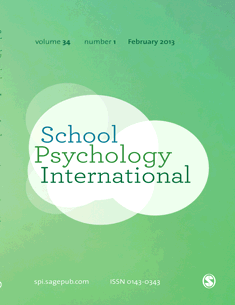
SCHOOL PSYCHOLOGY INTERNATIONAL
Empowering Students Through Research and PracticeSCHOOL PSYCHOLOGY INTERNATIONAL is a leading academic journal published by SAGE Publications Ltd, focusing on the interdisciplinary fields of developmental and educational psychology, education, and psychiatry and mental health. With its origins dating back to 1979, this esteemed journal aims to advance the understanding and practice of school psychology by disseminating high-quality research and innovative practices that support the development and well-being of students globally. Recognized for its impact, it currently holds a Q2 ranking in Developmental and Educational Psychology, a Q1 ranking in Education, and a Q2 ranking in Psychiatry and Mental Health according to the latest 2023 quartile assessments. The journal's commitment to excellence is further evidenced by its impressive standings in Scopus Ranks, where it occupies significant percentiles across various categories. Scholars and practitioners looking to stay at the forefront of research in school psychology can access this journal for insights that explore critical issues faced within educational systems, making it an invaluable resource for advancing both theoretical and applied knowledge.

International Journal of School & Educational Psychology
Exploring Innovative Pathways in School PsychologyThe International Journal of School & Educational Psychology, published by Taylor & Francis Ltd, is a premier academic journal dedicated to advancing the fields of educational and developmental psychology. With an ISSN of 2168-3603 and E-ISSN 2168-3611, the journal has been a valuable resource since its establishment in 2013, with contributions to the field continuing through 2024. The journal's commitment to rigorous research is evident in its Q2 ranking in both Developmental and Educational Psychology and Education categories in 2023, as well as its notable Scopus rankings, placing it in the top 25% of educational journals. Although it does not offer open access options, the journal provides an essential platform for disseminating high-quality research that enriches the understanding of psychological principles in educational contexts. Targeting researchers, professionals, and students alike, the International Journal of School & Educational Psychology strives to highlight innovative methodologies, practical applications, and theoretical discussions that shape educational practices and foster optimal learning environments.

PSICOTHEMA
Your Gateway to Cutting-edge Psychological ResearchPSICOTHEMA is a premier open-access journal dedicated to the field of psychology, published by the COLEGIO OFICIAL DE PSICOLOGOS DE ASTURIAS in Spain. With an impressive impact factor and a distinguished presence in the academic community, PSICOTHEMA has established itself as a vital platform for disseminating innovative research and insights in psychology since its inception in 1989. The journal embraces a broad scope, covering diverse topics within psychology and ranks within the top quartile (Q1) in the 'Miscellaneous Psychology' category as of 2023, making it a key resource for researchers and practitioners alike. With a current Scopus rank of #32 out of 216 in General Psychology and an 85th percentile ranking, it underscores PSICOTHEMA’s commitment to quality and relevance. Researchers, professionals, and students are encouraged to explore its extensive repository of articles, which promotes both theoretical knowledge and practical applications in the ever-evolving landscape of psychological science.